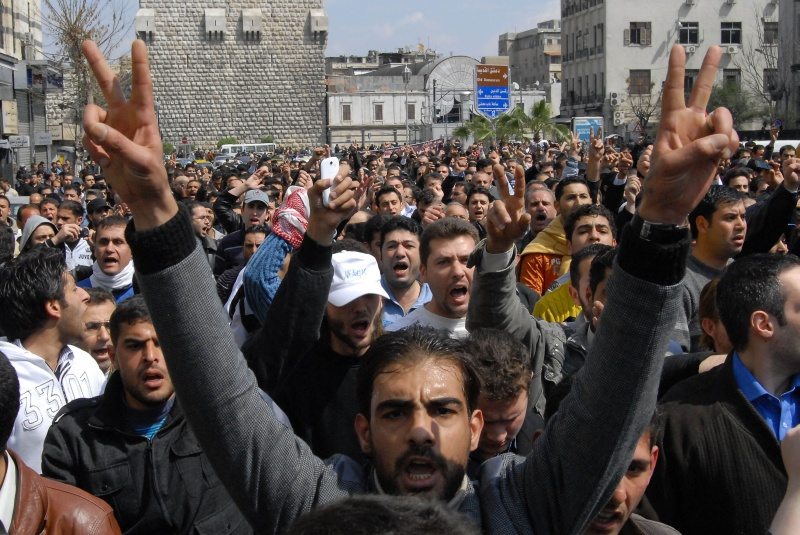Rebel forces were bracing Friday for a decisive “mother of all” battles in Aleppo, as Washington warned the Syrian army could be preparing to carry out a massacre in the country’s second city.
The Syrian army has been sending waves of reinforcements towards the northern city, and a security source told AFP the offensive feared by the rebels could come as early as Friday.
“The special forces were deployed on Wednesday and Thursday on the edges of the city, and more troops have arrived to take part in a generalised counter-offensive on Friday or Saturday,” the security source said of Aleppo.
Fighting raged in Aleppo on Thursday as clashes also shook parts of Damascus and other areas, with at least 121 people reported killed — 64 civilians, 32 regime troops and 25 rebels.
Rebels fighting to topple President Bashar al-Assad’s regime also brought in reinforcements, with the source estimating that between 1,500 and 2,000 opposition fighters had arrived from outside Syria’s most populous city to reinforce some 2,000 already fighting inside Aleppo.
“They are mainly present in the southern and eastern suburbs of the city, mainly Salaheddin and nearby districts,” he said.
The airport was cut off from the city, as four of the five roads leading to it were under rebel control, he added.
Rebels also said a regime assault appeared imminent.
“The army’s reinforcements have arrived in Aleppo,” Colonel Abdel Jabbar al-Okaidi, a spokesman for the rebel Free Syrian Army (FSA), told AFP via Skype.
“We expect a major offensive at any time, specifically on areas across the southern belt, from east to west.”
Okaidi added that some 100 tanks and a large number of military vehicles had arrived in the country’s commercial hub.
The Britain-based Syrian Observatory for Human Rights reported that regime forces pounded the Salaheddin neighbourhood in the south and Jazamati in the east.
On July 20 the rebels launched an all-out assault to overrun Aleppo, a move analysts say is aimed at establishing a bastion close to the rebel military headquarters in neighbouring Turkey.
The newspaper Al-Watan, which is close to the regime, led on Thursday with the headline “Aleppo, the mother of all battles,” adding that “the army continues to chase terrorists in the outskirts of Damascus and the province”.
Citing an Arab diplomatic source, it added: “Aleppo will be the last battle waged by the Syrian army to crush the terrorists and after that Syria will emerge from the crisis.”
Washington warned that the Syrian regime may be preparing to carry out a massacre in the city.
“This is the concern, that we will see a massacre in Aleppo, and that’s what the regime appears to be lining up for,” said State Department spokeswoman Victoria Nuland.
“Our hearts are with the people of Aleppo. And again, this is another desperate attempt by a regime that is going down to try to maintain control, and we are greatly concerned about what they are capable of in Aleppo.”
But she stuck to the US position of only providing non-lethal assistance to the opposition rebels who have been fighting for 16 months to topple Assad.
“We do not believe that pouring more fuel on this fire is going to save lives. We are working in non-lethal ways. We are working to support the Syrian opposition,” the spokeswoman told journalists.
As UN heritage agency UNESCO called for forces fighting in Syria to avoid damaging cultural sites, in particular in world heritage site Aleppo, UN chief peacekeeper Herve Ladsous said there was “no plan B”.
“There is one political process for the time being, that is the six-point plan of the joint special envoy Kofi Annan,” he told reporters in Damascus.
“And as you know, and has been said time and again, there is no plan B. There is no alternative to that.”
Annan’s plan called for an inclusive political process, a ceasefire, humanitarian aid, release of detainees, freedom of movement for journalists and peaceful demonstrations to be allowed.
“Syrians killing Syrians is something that should not continue,” Ladsous added.
Clashes also erupted in and around southern Damascus, with five children among 16 people killed when a village outside the capital was shelled while fighting rocked the Yarmuk Palestinian refugee camp, the Observatory and witnesses said.
Regime helicopters also strafed targets in Al-Hajar Al-Aswad neighbourhood, activists and residents said.
“Last night was quiet but people woke up to the sound of explosions and shelling from seven o’clock in the morning,” an activist calling himself Abu Qais al-Shami told AFP.
After a week of heavy clashes, activists say regime forces have largely regained control of Damascus, with just a few pockets of resistance remaining.
French Foreign Minister Laurent Fabius said on Thursday Assad’s regime was bound to fall.
“I’m confident that sooner or later, Bashar will fall,” he said at a Warsaw news conference, describing the actions of the regime as “abominable behaviour”.
Meanwhile, Israel on Thursday boosted security along its ceasefire line with Syria in the occupied Golan Heights, an Israeli source said on condition of anonymity.
Syria’s foreign ministry confirmed the defection of three diplomats, but downplayed their importance and indirectly accused Qatar — where they reportedly fled — of encouraging “national division”.
It named them as Lamia Hariri, charge d’affaires in Cyprus, her husband Abdel Latif al-Dabbagh, ambassador to the United Arab Emirates, and Mohammed Tahsin al-Fakir, security attache in Oman.
A European Commission aid expert said on Thursday the humanitarian situation in Syria had taken a dramatic turn for the worse.
“It’s like running behind a train that constantly keeps accelerating,” said the official, adding that more funds were needed to assist refugees fleeing to neighbouring Iraq, Lebanon, Jordan and Turkey.
Tens of thousands of people have fled Syria to escape the violence which the Observatory says has killed more than 19,000 people since mid-March 2011.










